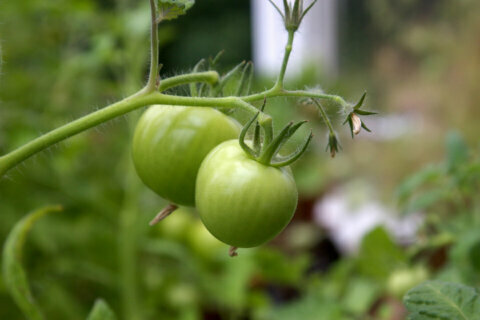WASHINGTON — In the new year, there are several noteworthy seed catalogs to check out to enhance your garden.
The W. Atlee Burpee company — better known as just “Burpee” — kicks off its 138th year with a strong pledge to never offer any genetically modified plants or seeds. Along with that, a shot of the company’s favorite new variety of summer squash, “cupcake,” will grace the cover of the new print catalog.
Cupcake is great for grilling, roasting and stuffing. Although it doesn’t look like the more familiar zucchini or crookneck types, cupcake is a summer squash and thus designed for fresh eating (not long-term storage like winter squash.)
Of course, Burpee is all about tomatoes, and this year’s new star introduction is “Jersey Boy” — a hybrid said to combine the legendary flavor of the heirloom variety Brandywine with the high yields of Rutgers, a variety considered by many to be the classic Jersey tomato.
Also new are thornless raspberry and blackberry canes — and Bee’s Knees, a new variety of pollinator-attracting bee balm with wonderfully showy and fragrant flowers. This new Monarda is designed to look great and still attract hordes of non-stinging native bees to pollinate all your flowers and fruits.
You can see it all or request a copy of their print catalog at www.Burpee.com. Mention my name at checkout (they call me Mikey) and they’ll take $10 off your order.
It’s a Tomato. It’s a Potato. It’s Both
Grafted tomatoes are all the rage these days. Growers take a classic tasting variety that has disease issues and graft it onto the roots of a variety that’s been shown to be highly resistant to those problems, thus increasing your chances of getting great-flavored tomatoes on disease-free plants. (Always keep the graft of any grafted plant well above the soil line to receive these benefits.)
Well, the Territorial Seed Company takes this idea to ridiculous heights in its new catalog with the introduction of Ketchup and Fries — a single plant that produces cherry tomatoes up top and russet potatoes below ground. Yes: a tomato plant grafted onto a potato plant, or “TomTato,” as they call it. Potatoes and tomatoes are close botanical relatives, which makes this trick possible. These plants aren’t genetically engineered — they’re just two different plants spliced together by experts using by-hand techniques that go back a century.
Introduced in the UK last year, Territorial warns that they have a very limited supply of these freaky-deaky plants, and people who wish to try one or two in their garden need to get their orders in now — phone or Internet only.
Get the details or request a print catalog at www.territorialseed.com.
Bad news for Japanese Beetles
The mail-order company Gardens Alive doesn’t just sell alternatives to garden chemicals; it often participates in their research and development and helps introduce them to the market.
Back in the late ’80s, it arranged EPA registration for the natural pre-emergent weed-and-feed for lawns, corn gluten meal. Gardens Alive calls its branded product WOW! More recently, it introduced an entirely new (and non-toxic) broadleaf weed-killer made with iron-phosphate.
And in their new 2015 catalog they introduce something just as big: a brand new Bt that targets Japanese beetles. Just like the other Bts already in use, this one is a naturally occurring soil organism. (The other, older Bts are BTK, which targets caterpillar pests; and BTI, which prevents mosquitoes, blackflies and fungus gnats from breeding).
This new kid on the block—known as BTG (the G stand for “galleriae”)—is available in two forms: As a powder (which GA calls “Grub Halt”) that’s applied to the soil in summer to kill lawn grubs, and “BeetleJUS”, a powder that you mix with water and spray on plants—like roses—that are under attack by the armored adults.
And because all forms of Bt are incredibly pest-specific, there’s zero danger to people, pets, birds and pollinating bees. Bees can consume the pollen of sprayed plants and not be harmed — it only affects beetles that actually chew on plants and grubs chewing on the roots of your lawn. This is big.
The new Gardens Alive catalog also offers a large variety of plants and seeds as well as a full line of non-toxic pest controls and fertilizers, plus a 17-page visual guide to insect pests, plant diseases and weeds, designed to help you correctly identify and fight your foe.
Learn more or request a printed catalog at www.gardensalive.com. Deal: Gardens Alive is offering $25 off your order if you use a special WTOP keycode at checkout. It’s the number 0167272.
Abraham Lincoln, Moon & Stars and a Naughty Little Pepper
For a company celebrating their 145th year, the R. H. Shumway “illustrated Garden Guide” seed catalog sure has some newfangled offerings. Alongside legendary heirloom tomatoes such as Brandywine and Abraham Lincoln (which Shumway introduced in 1923), it touts grafted tomatoes (great old varieties tagged onto super-hearty rootstocks) and a new snow pea (Golden Sweet) which has golden yellow fruits with flowers that are bi-colors of purple.
You’ll find all the legendary old varieties here as well, such as the fabled Moon and Stars watermelon, hummingbird-attracting Scarlet Runner Beans and Bloody Butcher — an heirloom corn with skyscraper stalks and blood-red kernels that can be picked young as a sweet corn or left on the plant to dry into the makings of naturally red tortillas and chips.
They even carry the slightly naughty — and highly sought-after — “Peter Pepper.” And if you order by March 15 they’ll send you two free packs of seed — an heirloom pear tomato and a hot pepper.
Get the details or request a catalog at www.rhshumway.com.
The craziest, most eclectic catalog of all
True horticultural enthusiasts always look forward to the new edition of the J L Hudson Ethnobotanal Catalog of Seeds, filled with rare varieties, old favorites and seeds for plants that most people didn’t know produced seeds — all packaged in the quirkiest, most libertarian and egalitarian style imaginable.
The company says, “We are a public access, public domain seed bank. We expressly prohibit the use of our seeds or plants in any form of genetic engineering or research that would result in any form of patented variety.”
Plants among their listings that I highly recommend include:
- Elephant’s Head amaranth — an ornamental variety of an ancient food plant that produces a huge maroon-colored elephant-like seed head (complete with big flappy “ears” and a trunk) on a tall stalk.
- Heirloom Italian sprouting broccolis (such as the classics “Calabrese” and “Di Ciccio”) that continue to produce side shoots after the main head is cut.
- Oaxacan Green — an ancient flour corn with emerald-green kernels whose ears can be left on the plant to dry for making amazingly colored tortillas and chips or picked young and roasted whole with lime, salt and chile powder for an authentic — and delicious — Mexican marketplace treat. “The most beautiful and delicious fresh corn we have ever eaten,” swears the highly individualistic seedsman himself.
And to top it all off, the company has ridiculously low prices (around $2 a packet generally) and shipping costs (a mere $2.50 for the first 40 packets of seed.) These guys are crazy — in a very good kind of way.
Join the madness or request a catalog at www.jlhudsonseeds.net.
Follow @WTOP on Twitter and WTOP on Facebook.







